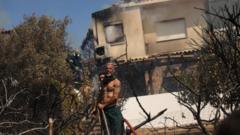A large wildfire has swept through the coastal towns of Palaia Fokaia and Thymari, situated 40 km southeast of Athens, igniting homes and forcing evacuations. The flames initially erupted in low vegetation but rapidly spread to residential areas amidst Greece's first summer heatwave, reaching temperatures of up to 40°C. Local officials reported the destruction of at least 20 homes, with many others suffering severe damage.
As the situation worsened, local residents united with firefighters, forest rangers, and aerial support in a bid to contain the blaze. The coast guard was also deployed in the area. Emergency alerts were disseminated via Greece's 112 system, instructing residents to evacuate several towns and villages rapidly.
In response to increasing wildfire incidents due to prolonged hot summers and climate change, Greece has bolstered its firefighting efforts. Authorities have deployed an additional 18,000 firefighters, aided by volunteers, in preparation for the remainder of the fire season ending in October. Earlier this week, substantial fires consumed thousands of hectares on Chios, one of Greece's islands.
A Georgian woman was arrested after allegedly sparking a fire with a discarded cigarette this past Wednesday. One affected resident in Thymari recounted that fierce winds engulfed her home before she could return, while others shared how neighboring houses were lost to the flames.
Further up the coast towards Cape Sounion, the fire crossed a major road and advanced towards a hilltop, prompting the evacuation of over 1,000 individuals from endangered areas. Local authorities successfully rescued 11 tourists trapped on a beach by the raging inferno. Despite official evacuation orders, some residents chose to remain and defend their properties, utilizing improvised tools such as garden hoses, actions that put their lives at risk and hindered emergency responders.
Greek state broadcaster ERT reported that authorities rescued at least 40 people, including children and elderly residents, who had found themselves trapped. Fire Service spokesman Vasileios Vathrakogiannis stated that the firefighting teams faced an intense struggle both on land and from the air, specifically in regions where the fire threatened homes. Local officials described the situation as dire, with all municipal facilities opened to provide shelter and medical assistance to those in need.
In light of the ongoing situation, the head of Greece's fire service has dispatched a specialized arson investigation unit to determine the cause of the fire. The Greek Risk Assessment Committee has warned of extremely high temperatures inching closer, thereby increasing the potential for wildfires in areas such as Attica, Evia, Peloponnese, and the northern Aegean over the upcoming days.





















